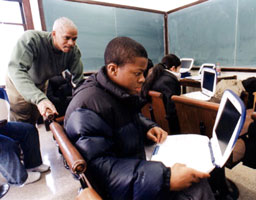|

The
Ivory Tower Meets the Inner City: Double Discovery at Columbia
U
By
Bruce Myint
Like
many high school students Radhameris Gomez can’t wait until summertime.
But while her friends look forward to spending their vacation
at the beach, Radhameris dreams about staying in school.
As a member of Columbia University’s Double Discovery Center (DDC),
Radhameris plans to spend her summer in DDC’s residential academic
program – studying with other high school students on the Ivy
League campus. “You wake up take breakfast, take classes, lunch,
clubs, have time to do our homework, gym, and then tutoring. You
get to live on the Columbia campus,” she rejoices. “You experience
college. You really feel like ‘Oh, I’m in college!’”
The Double Discovery center, founded in 1965, began as an experimental
summer program. It was established by Columbia College students
hoping to open the gate between the ivory tower and the inner
city.
Columbia students and officials would share their experiences
with low-income and first-generation college-bound high school
students from Harlem. At the same time, urban youths would educate
the Columbia community about life in the inner city.
One of the frontlines in President Johnson’s ‘War on Poverty’,
the DDC began by bringing more than 100 students onto campus for
a summer program. Since then, it has remained a hallmark of student
activism, evolving into a department at Columbia College complete
with a full-time staff and a legion of volunteers.
The DDC currently administers two year-round academic programs
that supplement what students receive in their high schools. Classes
take place after school and on weekends.
The Center’s Upward Bound Program, which serves approximately
165 9th and 10th graders every year, offers classes, advising,
test-prep and counseling services to either low-income or first-generation
college bound students. The Talent Search Program offers similar
services to students in grades 7-12. To be considered for admission,
students must live and/or attend school in the Borough of Manhattan
and submit an application.
The DDC has posted impressive results over the last 36 years.
In 2000, the high school graduation rate in New York City was
49.9 percent. High school students affiliated with the DDC graduated
at a rate of 96 percent.
Nationwide, 44 percent of high school students enroll in college.
Among the high school students at DDC, that number is 94 percent.
How do they explain their success? Executive Director Olger Twyner
III cites the importance of providing more attention to students
while demystifying the path to higher education. Many of DDC’s
students come from schools with a limited range of classes and
a shortage of counselors. Once in the program, they find opportunities
to take courses in creative writing, astronomy, computer science,
and music. At the same time, the center offers workshops in time
management, financial aid, and conflict resolution.
One of the DDC’s greatest features, however, is its location on
a college campus. Students at the center benefit from simply being
part of a higher education community. “Bringing students to the
Columbia campus for programming helps demystify the college experience,
Twyner explains. “Students are on campus interacting with college
students through our programming and are apt to be less intimidated
once they actually enroll in college. We are able to assist students
with getting acclimated to college life.”
Radhameris Gomez echoed that sentiment, “People in school think
this is such hard stuff. ‘Oh, will I make it to college?’ But
when you get here, they actually help you and they walk you through
the whole process… So it’s not hard like at high school where
you see everybody missing their lunch period to meet with their
counselors. They really help you through it. It’s less stressful.”
Although ‘less stressful’, the road from Harlem to higher education
is by no means easy. Many at the center are first-generation college
bound students– the first in their families to go on to higher
education. This often creates added pressure, Jacqueline Sirgo,
the Upward Bound counselor and a Double Discovery alumnus, explains.
“On top of the pressure of not knowing how to work the system,
first generation students, deal with the pressure of ‘can I handle
college?’ [that comes from] parent’s high expectations and sometimes
fear.”
To that end, the DDC also brings parents into the fold by offering
parent and guardian workshops through its counseling services.
For first-generation students in particular, Twyner sees the DDC
playing an especially important role, since first-generation college
bound students will not be able to turn to their families for
advice on going to college.
“Being
a first generation college-bound student means the student is
a pioneer, a trailblazer,” he describes. “The student is embarking
upon a path that has not been completed by prior generations in
the student’s family. As a result, a student will often have to
rely on others outside the family for information and assistance
with getting into college.”
One of those trailblazers is Juan Chen, who came to the country
speaking “no English at all” and unfamiliar with the college application
process. Like many of DDC’s students, Juan learned about the center
through her school counselor.
After years of working with volunteer tutors and taking classes–
many of which were Saturdays –Juan beams when she talks about
how hard she worked to apply to more than a dozen colleges, “I
feel so lucky to come here. So lucky…this is the first step to
my future life.”#
Education Update, Inc., P.O. Box 20005, New York, NY 10001. Tel:
(212) 481-5519. Fax: (212) 481-3919. Email: ednews1@aol.com.
All material is copyrighted and may not be printed without express consent of
the publisher. © 2001.
|

